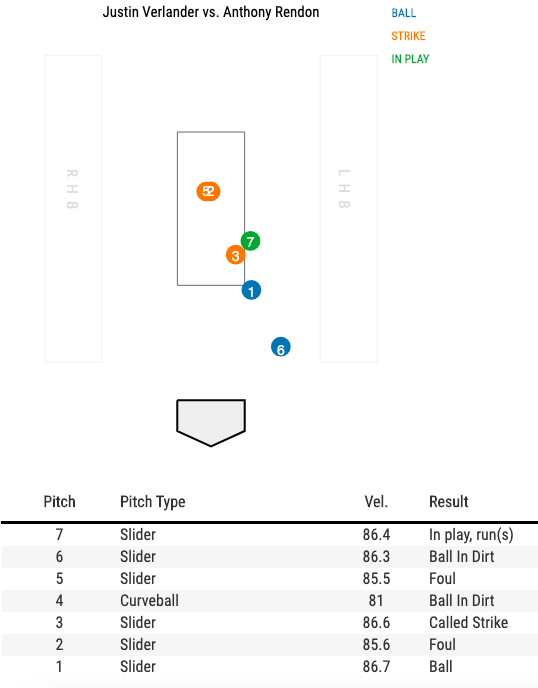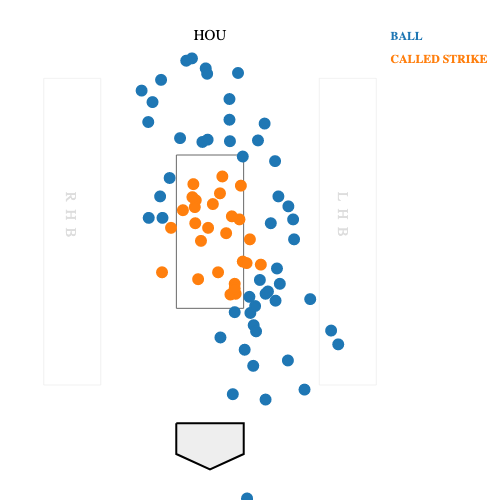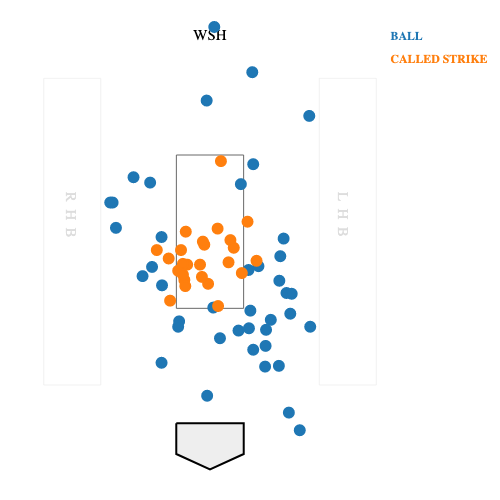Ball don't lie: Ranking the 10 wildest moments from a bananas Game 6
Well, that was nuts.
After five almost uniformly underwhelming World Series games, the Washington Nationals' season-saving 7-2 victory over the Houston Astros in Game 6 more than made up for the Fall Classic's relative lack of action. Multiple lead changes, one of the most controversial calls in World Series history, a justice-restoring home run, unforgettable pimpery, an all-time pitching performance, and even an ejection made Tuesday night's affair an instant classic.
Before these two clubs play for all the marbles in Game 7 at Minute Maid Park on Wednesday, let's examine the 10 craziest moments from a bananas Game 6.
10. Rendon gets Nats on the board
If the Nationals were to wake from their offensive slumber after scoring three runs combined over their previous three games, they needed one of two things to happen in Game 6: better efficiency with runners in scoring position, or more production from Anthony Rendon - their suddenly scuffling superstar who'd managed a meager .200/.273/.300 line through the first five games of the series. Washington got both of those things in the first inning to take its first lead since Game 2. After Adam Eaton bunted leadoff hitter Trea Turner over to second base to put a runner in scoring position two batters into the game, Rendon outlasted Justin Verlander in an expert-level, seven-pitch plate appearance that didn't feature a single fastball. With the count full, Rendon poked the sixth slider of his at-bat through the vacated right side of the infield, plating Eaton on a ground-ball single with an expected batting average of just .180.

(Courtesy: Baseball Savant)
Rendon's first-inning knock increased his club's win expectancy to 60% just three batters into the contest, and the early lead presumably afforded the Nationals a collective breath of relief after floundering at the plate for three straight games.
9. Holbrook errs early
A bad strike-three call in the first inning of a tie game wouldn't normally constitute a wild moment, but this one makes the cut. For one thing, it was a particularly egregious call. Strasburg's 2-2 changeup to Michael Brantley in the bottom of the first was off the plate by nearly 3.5 inches, according to Umpire Auditor, making it the worst call of the World Series. "I guarantee you," said FS1 color commentator John Smoltz. "The next time Brantley comes up to the plate, he's going to let him know that that pitch cannot be a strike."
We have a new worst call of the #WorldSeries!
— Umpire Auditor (@UmpireAuditor) October 30, 2019
Umpire Sam Holbrook rang up Michael Brantley on a pitch that missed outside by 3.47 inches! pic.twitter.com/ixsutsCX4t
The call presaged an altogether forgettable night for home-plate umpire Sam Holbrook, whose strike zone - as illustrated below - was consistently inconsistent.


Erroneous as it was, Holbrook's strike-three call was far from his most controversial ruling of the night. He ultimately played an outsized role in the drama of Game 6, and this was only the beginning.
8. Bregman goes boom
Alex Bregman hadn't enjoyed an especially productive World Series coming into Game 6, hitting just .182 with a .217 on-base percentage. That said, he'd still managed a couple of memorable swings to that point, erasing an early deficit in Game 2 with a two-run homer off Stephen Strasburg and putting Game 5 on ice with a grand slam off Fernando Rodney. On Tuesday night, the cocksure third baseman provided another indelible moment, swatting a go-ahead homer off Strasburg in the bottom of the first, then carrying his bat all the way to first base before bungling the handoff to first base coach Don Kelly. "I don't think Bregman should carry the bat to first base," AJ Hinch admitted postgame. Bregman's antics might not have impressed his manager, but they certainly reinforced his reputation as one of the game's premier home-run pimpers.
Bregman really carried the bat to first base 🤦♂️ pic.twitter.com/HqACuVqhxy
— Baseball Lifestyle™ (@BsbLifestyle__) October 30, 2019
The display did nothing to endear Bregman to retired slugger Mike Napoli.
Bregman is a douche!!!
— Mike Napoli (@MikeNapoli25) October 30, 2019
7. Eaton takes Verlander deep
Through the first four innings of Game 6, Verlander did a fine job dispelling his reputation as a lousy World Series performer. After allowing that lone first-inning run, the future Hall of Famer - who'd stumbled to a 5.73 ERA in six previous World Series starts - settled in nicely and trotted out for the top of the fifth with a 2-1 lead. Then Adam Eaton ruined it. With one out and nobody on, Verlander hung an 0-1 slider to Eaton, who erased the Astros' edge with a 381-foot solo shot that came off his bat at 103.6 mph, according to Baseball Savant. It was his hardest-hit ball since Game 4 of the National League Championship Series. Eaton's blast marked the beginning of the end for Verlander; the 36-year-old right-hander was done after five innings, having allowed three runs (more on that later) on five hits and three walks.
Adam Eaton just hit a VERY LONG BUNT.
— Baseball America (@BaseballAmerica) October 30, 2019
Tie game.
(Via @MLB)
pic.twitter.com/z3dX5hB6Vd
6. Strasburg lifted in 9th
If you found yourself screaming expletives at your TV when Nationals bench coach Chip Hale emerged from the dugout to remove Strasburg with one out in the bottom of the ninth, rest assured, you were not alone. Strasburg was only two outs away from the first complete World Series game since 2015 - and just the sixth this century - and there seemed no compelling reason to take him out. Washington led by five, and Strasburg - who'd allowed just two runs while fanning seven over 8⅓ innings - had thrown only 104 pitches, fewer than he had in any of his previous three starts. This was also his last outing of the year. Why not let the three-time All-Star finish what he'd started and make some history? Hale presumably had his reasons, but he nevertheless denied Strasburg a ceremonious end to yet another sublime postseason: In 36⅓ innings this October, Strasburg fashioned a 1.98 ERA with 47 strikeouts and four walks.
5. Soto gives it back
Juan Soto established eons ago he has some major sauce. The electrifying 21-year-old - who managed a 1.232 OPS through the first five games of the World Series - takes pitches with more swagger than most players celebrate home runs, and he simply won't abide being upstaged. So when he clubbed a 413-foot dong off Verlander to give Washington a 3-2 lead in the top of the fifth just two batters after Eaton tied the game, Soto celebrated his blast - the game-winning hit, as it turned out - in particularly delicious fashion. Lugging his bat nearly all the way to first base, a la Bregman, he then discarded it with serious elan. You'll tell your grandkids about this homer. Well, unless you're a boomer already writing the Nationals a strongly worded letter about how their young left fielder needs to respect the game more.
JUAN SOTO!! He gives the Nats the lead!!
— FOX Sports: MLB (@MLBONFOX) October 30, 2019
(He also carried his bat to first 👀) pic.twitter.com/f9QT30bkQP
4. Scherzer gets loose
Max Scherzer wasn't well enough to dress himself Sunday. Beset by "ungodly pain," as general manager Mike Rizzo put it, the three-time Cy Young winner was scratched from his Game 5 start due to neck spasms; it was very much in doubt if he'd be able to pitch again in the World Series at all. As such, it was something of a surprise when Martinez announced hours before Game 6 that Scherzer would start Game 7 if his club survived the night. And it was downright befuddling - in the most awesome way - when Scherzer started stretching and tossing in Washington's bullpen in the top of the seventh inning of Game 6 with his club clinging to a one-run lead. This dude couldn't so much as lift his right arm Sunday evening. Yet here he was, barely 48 hours later, getting ready to pitch in relief - something he's done just four times in the last decade - with his team's season on the line and the most tenuous of leads. A timely offensive outburst from the Nationals ultimately rendered his deployment unnecessary, but simply seeing Scherzer warm up in the bullpen made for some fine theater.
🚨 Max Scherzer is warming up 🚨 pic.twitter.com/6J4D0IAc98
— FOX Sports: MLB (@MLBONFOX) October 30, 2019
3. Turner called out for interference, all hell breaks loose
With the Nationals up by one in the top of the seventh with a runner on first and nobody out, a veritable poopstorm unfolded. Trea Turner was called out for interference after colliding with Yuli Gurriel and knocking his glove off his hand while attempting to leg out an infield single. Look, it's just easier if you watch it, OK?
Trea Turner was called out on this play.
— FOX Sports: MLB (@MLBONFOX) October 30, 2019
"That's a potentially series changing call." - Joe @Buck pic.twitter.com/E3Po7hSNcR
Long story short: Instead of the Nationals having runners on second and third with nobody out, Turner was called out and Yan Gomes was sent back to first because Brad Peacock's errant throw forced Gurriel to impede the bag at the last second; Turner literally had no way to avoid Gurriel and still make contact with the base. In Holbrook's judgment, though, this constituted interference, a violation of Rule 5.09(a)(11). Predictably, everyone on the Nationals' bench went berserk. Martinez started berating the umpires. A lengthy video view ensued. Turner called out Joe Torre, the league's chief baseball officer and head of umpires who was seated in the stands, for not stepping in and beseeched his manager to play the game under protest. The call was upheld following the review. Complete and utter pandemonium.
2. Martinez gets the (curiously timed) heave-ho
Look, nobody faults Martinez for being incensed by that interference call. Frankly, nobody could fault him for being cheesed about the umpiring in the World Series in general; as Gomes and Victor Robles can attest, it's been pretty abysmal. Still, it's somewhat odd Martinez chose to Hulk out on Holbrook and crew chief Gary Cederstrom at this particular moment - after the Nationals rendered that potentially cataclysmic interference call moot with a pair of runs to extend their lead to 5-2. You'd think a three-run advantage would've mollified Martinez somewhat. But, perhaps given how the officiating has victimized Washington throughout this series, the Nationals manager just couldn't restrain himself any longer.
.@Nationals Dave Martinez got a little heated between innings after Trea Turner was ruled out on an interference call 🤬😤 #WorldSeries pic.twitter.com/ZpCbn3oNo5
— Sportsnet (@Sportsnet) October 30, 2019
The rampage earned Martinez the first World Series ejection since 1996, when Bobby Cox - the most ejected manager in history - got tossed from Game 6 between his Atlanta Braves and the New York Yankees for arguing an out call at second base. Martinez's implosion, for what it's worth, would've definitely made Cox proud.
1. Ball don't lie
Just because interference may have technically been the right call doesn't mean it was a just ruling. "Nobody in history has ever sprinted to first base any way other than Trea Turner just did," as ESPN's Sam Miller astutely put it. It simply felt wrong that Turner should be called out - and the Nationals' rally kiboshed - on nothing more than an awkward baseball play devoid of any malice or nefarious intent. Thankfully, this cosmic wrong was righted moments later. Rendon lifted a two-out, two-run homer into the Crawford Boxes in left field, giving the Nationals restitution (and a 5-2 lead), turning that controversial call from a calamity to a footnote, and reaffirming for the umpteenth time: Ball don't lie.
Anthony Rendon'tcha just *love* to see it?#WorldSeries // #STAYINTHEFIGHT pic.twitter.com/bpTnMiLb10
— Washington Nationals (@Nationals) October 30, 2019
Jonah Birenbaum is theScore's senior MLB writer. He steams a good ham. You can find him on Twitter @birenball.